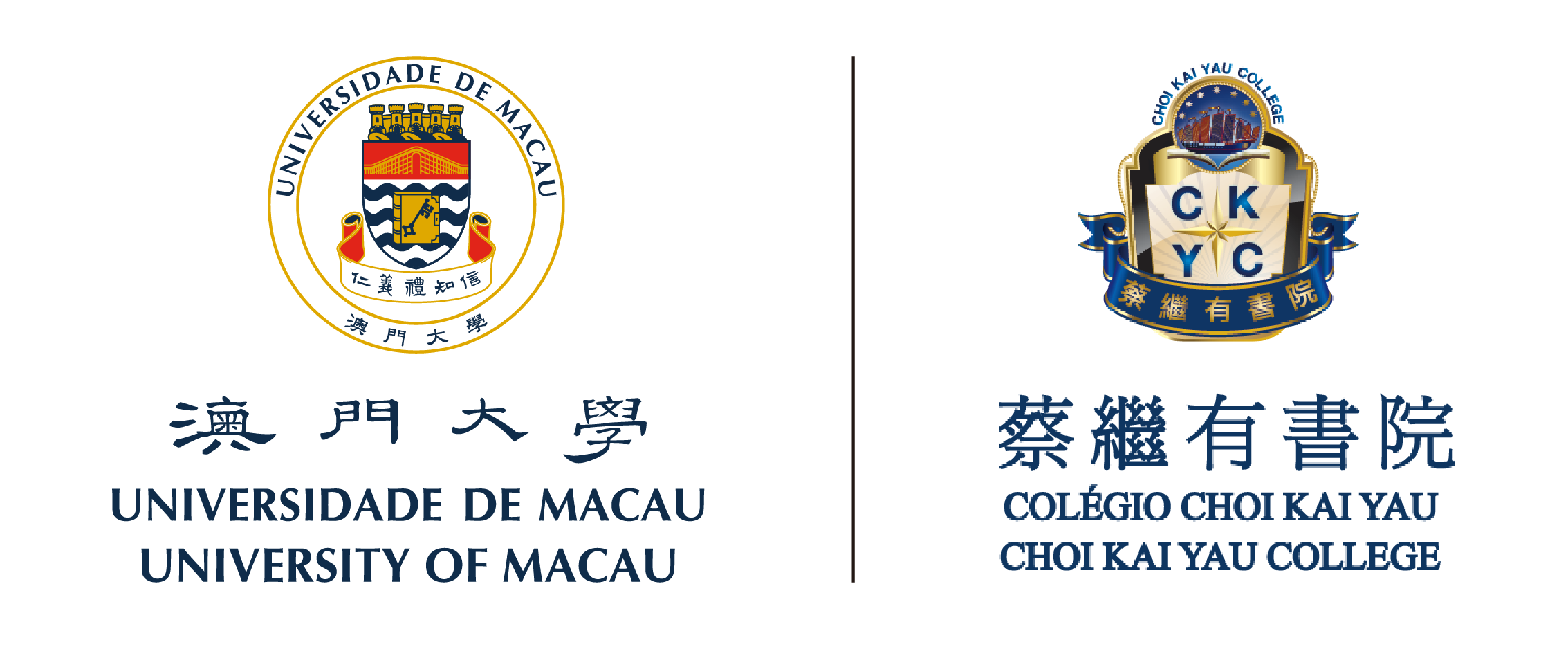Garry Wong, CKYC Non-Resident Fellow and Professor in the Faculty of Health Sciences (FHS) of the University of Macau (UM), believes that it is important to put himself in his students’ shoes when designing his courses. Known among his students as a tech-savvy teacher, he has integrated technology into classroom teaching, including setting up a studio in his office to make instructional videos, in order to meet the needs of the new generation of learners. Because of his outstanding performance in teaching, he was awarded the UM Teaching Excellence Award for the 2021/2022 academic year. For Prof Wong, education is about guiding students on their learning journey through human interaction. Having worked as an educator for more than 30 years, Prof Wong has developed a strong passion for teaching. He not only aims for continuous improvement in his teaching methods, but also serves as a guiding light for his students to help them pursue their dreams.
Flipped Classroom Popular among New Generation of Learners
Born in Canada and raised in California in the United States, Prof Wong is a Chinese American scientist who obtained his master’s and PhD degrees from North Carolina State University. Before joining UM in 2014, he worked as a postdoctoral fellow at the National Institutes of Health in the US and then lived in Finland for 20 years, serving in various research positions at the Academy of Finland and as a professor at the University of Eastern Finland. Because of his friendly demeanour and engaging, interesting teaching style, Prof Wong’s courses are popular among students, and he is always thinking about how to meet the needs of the new generation of learners from their perspective.
Prof Wong is currently a professor in the FSH Department of Public Health and Medicinal Administration and head of general education (GE) implementation at UM. To improve students’ learning outcomes, he uses information technology creatively in his courses, his teaching materials, and student evaluation. He even set up a chroma key studio in his office to create instructional videos for different interactive teaching models, such as flipped classroom, blended learning, personalised education, and asynchronous learning.
‘Students today are considered the internet generation as they have been exposed to new technologies from a young age. They absorb information from various sources and use tablets to take notes in class. For this reason, we have to develop new teaching methods to further engage them in class and in learning,’ says Prof Wong.
Always on the cutting edge of education, Prof Wong sees the pursuit of educational breakthroughs as a personal goal. He believes the traditional mode of teaching alone is not enough to provide a quality learning experience for students today, and it is necessary to integrate new digital elements into teaching. It was quite an adventure for him when he first learned to use e-learning tools in his lessons. After accumulating practical experience for a few years, he confirms that these tools can greatly improve classroom interaction and fun instructional videos can stimulate students’ thinking, improve their concentration and engagement in class, and even encourage them to read before going to class.
Prof Wong first used videos as teaching aids a decade ago in Finland. After joining UM, he began producing his own videos as e-learning materials for his lessons. He frequently attends forums and workshops organised by the Centre for Teaching and Learning Enhancement at UM, where he discusses with other teachers how to use information technology and combine different media such as digital text, audio, or video to improve students’ learning outcomes. His students describe him as a tech-savvy teacher because he is so good with e-learning tools, but he says modestly: ‘I’m not that good. I’m just open to new things.’
Prof Wong personally set up all the equipment in his studio. The equipment is so professional that professors who know him well often visit the studio to borrow his tools. Prof Wong is always happy to share and help his colleagues develop lesson plans that take advantage of e-learning. In addition, he once took his students to the Ruins of St Paul’s to interview tourists about factors that affect health. ‘I hope to stimulate students’ thinking and give them a chance to learn about the views of different people on health,’ says Prof Wong, who has produced over 50 instructional videos to date.
Applying Knowledge in Real Life
Inspired by the Finnish approach to education, Prof Wong places a strong emphasis on the applicability of knowledge in real life. For example, in his general education course ‘Fun in Health Science’ offered in the 2022/2023 academic year, he did not dive right into the theories. Instead, he first told the students about the structure of the course and the expected learning objectives so that they could see the big picture before the details.
Prof Wong believes that teachers should guide students to apply their new knowledge instead of teaching straight from the textbook. ‘For example, I arrange for my students to perform simple health tests on themselves so that they can enjoy the fun of learning and consolidate their knowledge by putting it into practice,’ he says.
He is committed to student-centred, results-oriented teaching both inside and outside the classroom. In class, in addition to teaching knowledge from the textbook, he takes time to explain the theories behind nutritional supplements and healthy lifestyle to students. After class, he requires students to complete online assignments, including continuously tracking their sleep habits, diets, and workouts for several weeks during the course. The students are also encouraged to get rid of unhealthy habits and measure changes in their body and state of happiness, in order to find a healthy lifestyle that suits them. ‘When students have a clear understanding of how the body works, they can take responsibility for their own health,’ says Prof Wong.
Teaching with Patience
Jia Zhiqi, a third-year student in the Department of Accounting and Information Management, is currently on exchange at Queen Mary University of London. She attended Prof Wong’s course in her second year and remains impressed by it. ‘There were many students of arts or business majors in the class and they didn’t know much about biomedicine. Garry has a lot of patience and he took the time to explain the concepts to us and answer our questions,’ says Jia. Prof Wong’s GE course is very popular and attracts a large number of students every year. Nearly 400 students took the course in the last semester alone.
Prof Wong also often participates in activities organised by Choi Kai Yau College and Moon Chun Memorial College, which allows him to educate students outside the classroom. During lunch, he takes time to chat with students and shares tips on healthy eating that are not only interesting but also useful. ‘He is able to make boring topics inspiring to help us absorb the knowledge,’ says Jia.
Groundbreaking Research
Prof Wong received the UM Teaching Excellence Award for the 2021/2022 academic year for his exceptional teaching skills. In addition to being a passionate teacher, he is also a distinguished scientist in the field of health sciences. His research interests include pharmacology, toxicology, neuroscience, molecular biology, genetics, and bioinformatics. He has published over 130 papers and two textbooks.
20 years ago, Prof Wong and his research team pioneered the use of Caenorhabditis elegans models to replace mice as experimental animals for therapeutic research in neurodegenerative diseases, such as Alzheimer’s disease and Parkinson’s disease. He used many mice in his early studies but resisted putting them to sleep. Eventually he became allergic to mice and was determined to find a better model organism. At a research conference in Gothenburg, Sweden, he learned about Caenorhabditis elegans and wondered if this tiny 1-mm-long nematode could bring changes to the laboratory.
At the time, there was no nematode laboratory in Finland, so it was difficult for Prof Wong to secure financial support for nematode research. Like all innovators, he had to ask himself: ‘What comes first, the chicken or the egg?’ Luckily, Prof Wong had a lot of faith in his work and applied for his first academic sabbatical at the University of Washington in Seattle, where he could conduct nematode research with like-minded scientists. With determination and persistence, he eventually discovered that nematodes could be used as model organisms for neurobiology and ageing research, and he brought the result back to Finland.
On the day of the interview, Prof Wong received an email from a Brazilian research institute requesting the latest research data on nematode models. He explains that the life cycle of nematodes (two and a half weeks) is 40 times shorter than that of laboratory mice (two years). Nematodes not only make it possible to obtain results faster, they are also a more economical solution in terms of lab space. ‘From time to time, I receive emails from different research organisations asking for information about our research results or to send our nematode strains to them. We are happy to share our results and strains and also look forward to communicating with experts and scientists from around the world to benefit each other in research,’ he says.
Prof Wong has been using nematode models to study human genetic sncRNAs for nearly 25 years. His team is currently conducting extensive studies on dopaminergic neurons to observe how they degenerate under the influence of Parkinson’s disease, ageing, and environmental stress. The goal is to identify biomarkers for neurodegeneration in order to accurately predict risks of disease development in the general population (especially in people with a family history) and improve patients’ quality of life through early diagnosis and treatment.
The Greatest Satisfaction as a Teacher
Prof Wong believes that teachers have multiple roles: They are not only course designers and managers, but also life coaches for students. In addition to being effective and attentive communicators, he believes that good teachers must also be cooperative, adaptable, empathetic, and patient. Over the years, he provided guidance for many students. Despite his busy work schedule, he remains in touch with many of them after they graduate. ‘Education is about guiding students on their learning journey through human interaction,’ he says.
Xian Jiaqi is one of Prof Wong’s favourite students. After graduating from UM, she went on to pursue a Master of Science in Human Molecular Genetics at the Imperial College London in the United Kingdom and graduated in October 2022. During her second year (the 2017/2018 academic year) at UM, she took Prof Wong’s course ‘Development and Ageing’ and learned about his nematode research project. She volunteered to work in his lab to earn lab hours for the International Association for the Exchange of Students for Technical Experience’s international internship programme. After returning from her internship, she continued to volunteer in Prof Wong’s lab. ‘Garry has a lot of patience and his guidance allowed me to learn to conduct experiments independently and identify research questions. The experiences helped me familiarise myself with the work of researchers in the real world,’ she says.
‘Garry never stopped encouraging me to acquire new knowledge and always believes in me. We remain in touch with each other and when I encounter problems, besides my family, I can always go to him for advice,’ she adds. ‘Without his encouragement, guidance, and support, I wouldn’t have been able to land my dream job.’
Prof Wong married his wife Merja of Finnish nationality in 1993 and they settled in Finland. However, as his father’s ancestors were from Taishan, Guangdong province, and his mother grew up in Hong Kong, China was always on his mind even though he lived in the US and Europe for decades, and he hoped that one day he could move to Asia to experience Chinese culture. In 2013, the opportunity presented itself when UM recruited faculty members for the newly established FHS. ‘I remember telling myself that this would be the opportunity to teach in China!’ says Prof Wong. So with Merja’s approval, the couple embarked on their new journey together. ‘Macao is a vibrant Special Administrative Region in China and UM is a university with great opportunities. The university offers attractive work conditions to academic staff and I have taken my teaching and research to the next level thanks to its support,’ he adds.
Prof Wong joined UM in 2014, the year the current campus became operational and the FHS celebrated its first anniversary. Over the past nine years, Prof Wong has witnessed batches of his students graduating from UM and then moving on to study or work in different parts of the world to pursue their dreams. He is happy and very proud to see them challenge themselves in the international arena. ‘Things that give me the greatest satisfaction include making further achievements in teaching and research and seeing my students succeed in their studies, land their dream jobs or research positions, contribute to society, and shine in their life journey,’ he says.
Biography
Garry Wong is a Chinese American scientist. He obtained his master’s and PhD degrees from North Carolina State University and worked as a postdoctoral fellow at the National Institutes of Health in the US. He also lived in Finland for 20 years, serving at various research positions at the Academy of Finland and as a professor at the University of Eastern Finland. In 2014, he joined UM as a professor in the Department of Public Health and Medicinal Administration of the Faculty of Health Sciences. He received the UM Teaching Excellence Award for the 2021/2022 academic year for his exceptional teaching skills. His research interests include pharmacology, toxicology, neuroscience, molecular biology, genetics, and bioinformatics. He has published over 130 papers and two textbooks.
Text / Kelvin U, Trainee UM Reporter Huo Shiying
Data collection and text collation / Interns Chole Sung and Lei Kit I
Photo / Jack Ho, Trainee UM Reporters Liu Chenxin, with some provided by the interviewee
English Translation / Anthony Sou
Source: My UM ISSUE 120 / 澳門大學官方微信
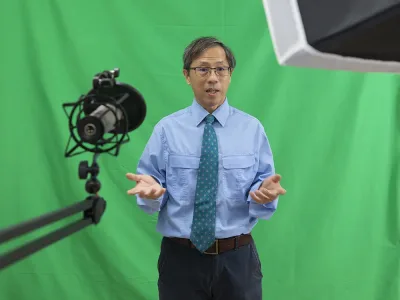
Prof. Garry Wong
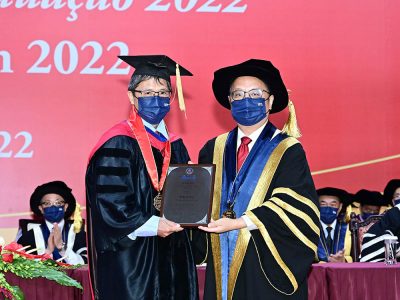
Rector Song (right) presented the UM Teaching Excellence Award to Prof. Wong (left)
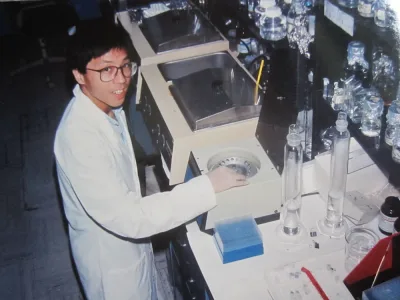
Prof. Garry Wong during his postgraduate studies in the US in 1987

Prof. Garry Wong and his student Jia Zhiqi
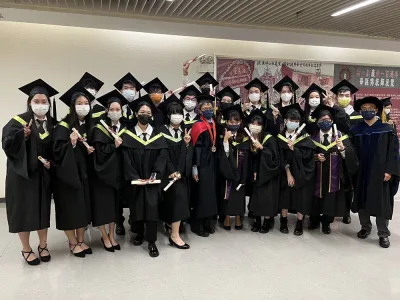
Prof. Garry Wong has trained many students over the years
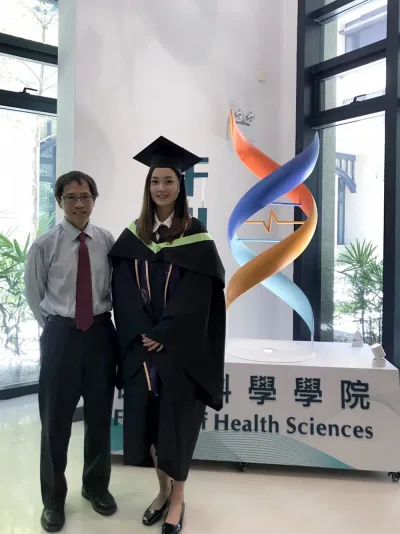
Prof. Garry Wong and his student Xian Jiaqi

